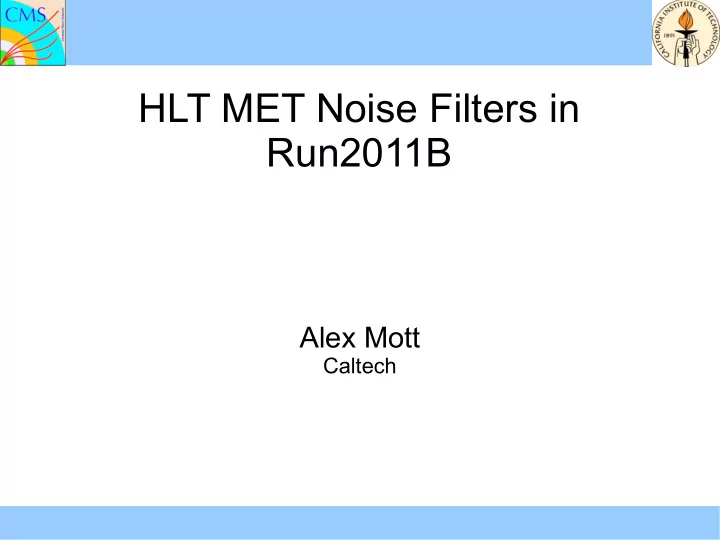

HLT MET Noise Filters in Run2011B Alex Mott Caltech
Review of Noise Filters ● HBHE noise filters were deployed online earlier this year ● Based on the offline Hcal HBHE Noise filters used in the PromptReco ● For HLT, add an additional safety factor to avoid rejecting possible good physics events ● If there are two or more additional RBXs with energy > 40 GeV, do not reject the event ● This filter was shown to overclean at HLT less then 1 ppm ● We intended to deploy this filter as part of the default HLT MET this fall ● Move to beta*=1m delayed this ● Performance of the filters degraded in Run 2011B – needed time to study
Scaling with Luminosity Run2011A Run2011B High PU Fill – ZeroBiasHPF0 PD Fraction of Events Rejected MET PD Offline Filter Online Filter ● The online HBHE Noise Filter is becoming considerably less efficient in rejecting noise as pileup increases ● The offline filter seems to be much less sensitive to the increase in pileup
Online Filter Inefficiency Frac of Events Passing 3 rd RBX Cut High PU Fill ZeroBiasHPF0 Fraction of events 40 50 60 With 3 rd RBX GeV GeV GeV E>40 GeV CaloMET > 60 GeV ● One issue is with the online safety cut ● At higher pileup, even Zero Bias events pass the cuts a substantial fraction of the time ● Raising the cut is dangerous ● The pileup falls off substantially over the course of the run ● Even at peak PU, there is a fairly large range of pileup possible event-by-event
Modifying the Online Filter ● The 40 GeV threshold is too low for the expected peak 2012 pileup conditions ● Simple raising the threshold is suboptimal for long fills with large pileup decay ● Two better options for modifying the limit: ● Inst. Lumi dependent: set the energy threshold as a function of the luminosity (need to check if this is technically possible) ● Event-by-Event: do something like L1FastJet to subtract the pileup energy on an event by event basis – keep 40 GeV threshold ● Perhaps we should consider adding a second, higher mass cut and accepting events passing this regardless of the noise filter ● i.e. for the HLT_MET200 path, only check the online noise filter for MET between 200 and 300 GeV ● This would suppress the trigger rate while still keeping full efficiency for very high MET events
Reducing the PU Effect One Idea: Apply an energy correction Frac of events passing online ● safety cut analogous to L1FastJet High PU Fill Order the RBXs by energy ● ZeroBiasHPF0 Compute the median energy of all RBXs > ● 5GeV except the 3 highest energy Subtract this from the energy of the ● third highest energy RBX, treat this as the energy for the purpose of the safety cut Run177201 Run177201 ZeroBias Energy Subtracted ZeroBias By this algorithm Energy of 3 rd RBX
Performance on High MET Events ● On very high MET events, the reduction isn't as dramatic as on ZeroBias This is not fully understood ● Would expect most of these events to ● be RBX noise overlaid on Zero Bias Run 177201 If this effect is real, need to ● MET PD understand why HLT_MET200 skim Perhaps there is other pathology ● in high MET events ● Its possible that these events are more empty than normal zero bias ● Would need to tune the subtraction algorithm ● Would accomplish a 50% reduction on the HLT_MET200_HBHENoiseFiltered path at the current pileup ● This is just a first test ● Suggestions for subtraction algorithm welcome
Removing the Noise from MET ● Try to estimate the MET the event would have had if not for the HBHE Noise ● Correct the MET in two possible ways ● Set the energy in all hits in the noisy RBX to 0 ● Treat the noisy energy as having energy equal to the second highest energy RBX ● Choose the larger of these two values as the “corrected MET” ● Try to define this in the safest way possible to always over estimate the corrected MET ● Apply a looser threshold to this corrected MET
Corrected MET Trigger Accept the event is cMET is greater than half the HLT MET threshold ● Half is just an initial test –> can be tuned ● Could conceivably try to recover events with MET lost by opposing HBHE ● Noise This is a very rare case, and may not be worth the effort ● This method could, in principle, reject a hard interaction coincident with ● HBHE Noise This event either had little real MET, so shouldn't have passed a MET ● trigger anyway Or had unbalanced energy coincident with the noise → probably ● unrecoverable offline anyway Accept Event NO YES YES MET MET MET MET HBHE Remove Recompute RECO RECO > 100 GeV? > 200 GeV? Noise? Noise MET NO NO Reject Event
Effect of the MET Cleaning Run 177201 MET PD HLT_MET200 Skim Events rejected by offline noise filter 80% reduction in MET200 Trigger Rate
Conclusion ● The noise cleaning efficiency of the online filters has decreased in Run2011B This is an inevitable consequence of the increased pileup ● ● Simply raising the threshold of the RBX safety cut is one possibility ● This doesn't take into account the change in PU conditions during the fill ● First attempt at introducing some pileup scaling in the cut shows modest gains in noise rejection efficiency – Retune the scaling to maximize rejection – Safety for signal still needs to be evaluated ● An alternative to doing the scaling is to try to estimate the MET without the spike and cut on that ● This shows the potential to greatly reduce rates ● Needs careful study for signal safety!!
Recommend
More recommend